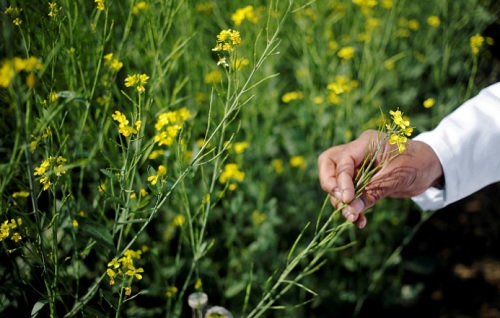NEW DELHI (Reuters) - India has frozen requests to commercially release a locally developed genetically modified mustard, an environment ministry document released on Tuesday showed, amid stiff opposition to lab-altered food from domestic activists and politicians.
The mustard variety would have been the first transgenic food crop to be allowed for commercial cultivation. But the environment ministry's Genetic Engineering Appraisal Committee (GEAC) has deferred approval despite a panel the ministry supervises giving the genetically modified (GM) mustard technical clearance last year.
"Subsequent to receipt of various representations from different stakeholders, matters related to environmental release of transgenic mustard are kept pending for further review," the GEAC said in minutes of a meeting released on the environment ministry's website marked "confidential and restricted circulation".

FILE PHOTO: An Indian scientist points to a patch of genetically modified (GM) rapeseed crop under trial in New Delhi, India February 13, 2015. REUTERS/Anindito Mukherjee/File Photo
Cotton is the only GM crop currently allowed to be sold in the world’s second most populous country where arable land is shrinking. U.S. company Monsanto Co dominates the cotton seed market in India, and often faces resistance from local companies over its position.
The environment ministry told parliament on July 31 that GM mustard had been recommended by GEAC to it for "consideration for environmental release and cultivation"
You can share this post!
Content

The Committee on High Posts has approved the nomination of Former Air Force Commander Air Chief Marshal (Retd.)

Former Chairman of SriLankan Airlines, Nishantha Wickramasinghe, arrested on allegation of corruption by the Commission to Investigate Allegations of Bribery or Corruption (CIABOC) has been remanded until July 1 by the Colombo Magistrate court.







Leave Comments